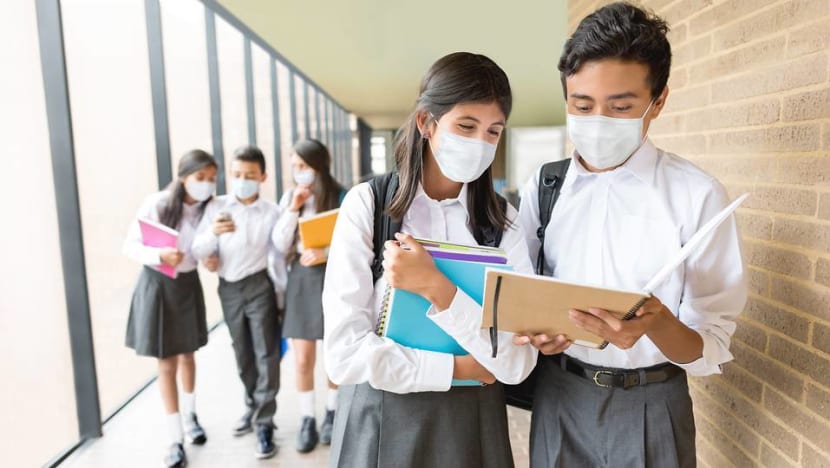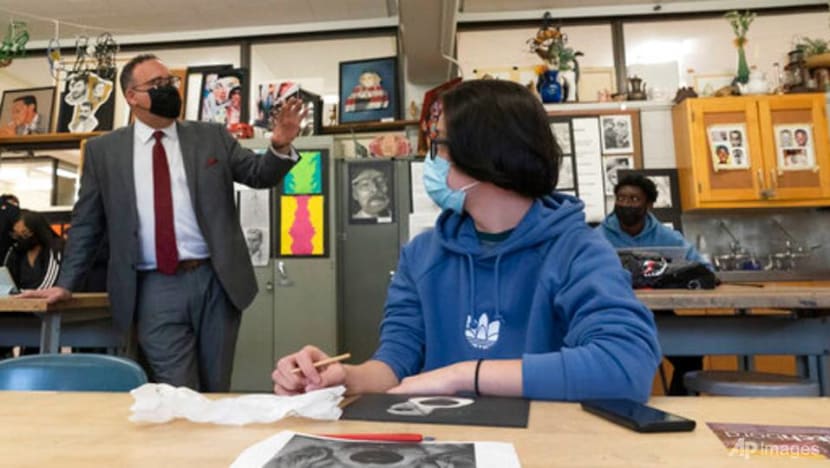Commentary: Unvaccinated teenagers risk turning schools into viral COVID-19 reservoirs
Without fast, strategic thinking on teenage vaccination, the UK's bid to loosen all restrictions on Jul 19 will spell Freedom Day for the virus, says the Financial Times' Anjana Ahuja.

Masked students in a school. (Photo: iStock)
LONDON: A series of pencilled lines on the kitchen doorframe show that my 13-year-old son overtook me last summer.
He is now taller, heavier and stronger than me, and enjoys an active academic and sporting life that does not easily accommodate strict social distancing.
He is also the only member of our household unvaccinated against COVID-19. In terms of infection, he is our weakest link, with the perfect mix of social contacts and physiology to catch and spread it.
READ: Commentary: Here’s why England is facing four more weeks of lockdown
UK YET TO HAVE RULES VACCINATING TEENAGERS
In early June 2021, the UK medicines regulator approved the Pfizer-BioNTech vaccine as safe and effective for children aged 12 to 15, but the UK Joint Committee on Vaccination and Immunisation has not yet ruled on whether to recommend it to all those aged 16 and 17, let alone younger teens.
With case numbers rising and hundreds of thousands of children being forced to isolate at home after testing positive or being in close contact with someone who has, the risk-benefit analysis seems to be shifting in favour of vaccinating all over-12s.
The most persuasive argument against vaccinating children is that most suffer mildly, if at all, from COVID-19, meaning they bear the risks of vaccination for little or no benefit to themselves.
This is especially true when community infection rates are low, reducing the chance that a child will suffer associated harms of exposure, such as illness, including long-COVID and disrupted schooling and socialisation.
HIGHER STAKES
But the rise in cases in the UK since mid-May is denting this rationale. A third wave is upon us.
There are more than 20,000 confirmed daily new infections, with an estimated 385,000 pupils absent from state schools on 24 June due to Covid-19. That is 5.1 per cent of the relevant school population, up from 3.3 per cent the week before.
Being out of school damages children educationally and socially; there is an added economic cost if parents stay off work.
Health Secretary Sajid Javid has proposed abandoning rules requiring pupil isolation. That is a prescription for mass infections in schools, especially given that masking and social distancing requirements were recently dropped.
The Delta variant is more transmissible than the Alpha variant; the jury is out on whether it causes more severe illness.
Christina Pagel, a member of the Independent Sage group of science advisers, notes that herd immunity requires about 85 per cent of the population to be immune, and children make up 21 per cent of the UK population. In short, the UK’s “vaccine wall” has a large, teen-shaped hole in it.
READ: Commentary: Variants versus vaccines is becoming the new COVID-19 race
READ: Commentary: We have to live with an endemic COVID-19. Here's what that could look like
That, in turn, means either ongoing transmission, with all its risks (the vaccines are great but not perfect) or continued interventions like social distancing.
This capricious virus has the capacity to evolve further. Leaving older children unjabbed risks creating viral reservoirs capable of cooking up future variants, some of which might not be as benign to the young.
CONCERNS OVER RARE HEART INFLAMMATION
The chief vaccine-related risk to teenagers, mostly young males, appears to be myocarditis or pericarditis, two types of heart inflammation, linked to mRNA vaccines, such as those made by Moderna and Pfizer-BioNTech.
As of Jun 28, from a total of 324 million doses of all vaccines given across all ages, the US Centers for Disease Control and Prevention confirmed 518 such cases in those aged 30 or under, usually within days of a second dose. The CDC notes that most recovered, and it still recommends that over-12s receive a jab to protect them and their communities.

Some worry that rare adverse events may knock confidence in other childhood vaccinations. But given the UK’s current predicament it is logical to fight the threat in front of us, not a theoretical future adversary.
Clinicians are still cataloguing the long-term effects of natural infection. The idea that children should catch an unpredictable virus in preference to having a largely safe and effective vaccine will trouble many.
Putting aside the question of whether young people in the UK should have priority over those at higher risk in the Global South, this discussion shows there are no good options in a pandemic, only less bad ones.
READ: Commentary: Teachers now have new jobs. Schools will never be normal again after COVID-19
READ: Commentary: In Singapore’s bold plan to reopen, these are the hard-nosed decisions society must make
Arguably, offering (not mandating) first doses to willing teens, supply permitting, before school ends this month would have been a reasonable strategy to protect children, blunt community transmission and favourably adjust the risk ahead of a September return to the classroom.
Instead, the UK is entering the second summer of the COVID-19 pandemic much as it entered the first: talking tough against a shape-shifting virus that responds only to deeds, not words.
Without fast, strategic thinking on difficult issues such as teenage vaccination and indoor ventilation, Javid’s bid to loosen all restrictions on Jul 19 will spell Freedom Day for the virus, as well as for us.
(Are COVID-19 vaccines still effective against new variants? And could these increase the risk of reinfection? Experts explain why COVID-19 could become a “chronic problem" on CNA's Heart of the Matter podcast.)










